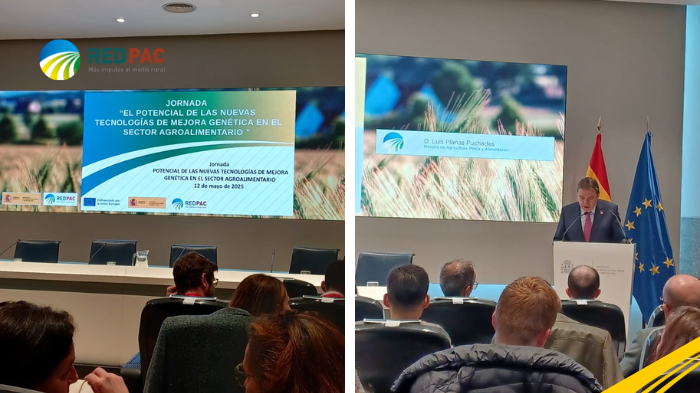
20 de May de 2025
Innovación
Resiliencia y competitividad
Biodiversidad y paisaje
During the day, various experts presented new genomic techniques as an innovative tool that could contribute to increasing the resilience and sustainability of the agri-food system.
- During the day, various experts presented new genomic techniques as an innovative tool that could contribute to increasing the resilience and sustainability of the agri-food system.
- The event also served to present the scientific advisory project on new genomic techniques carried out by CRAG (Center for Research in Agrigenomics) and the Ministry of Agriculture, Fisheries and Food (MAPA).
- The event has delved into the regulatory framework of these new techniques
"The world doesn't wait, the world turns." With these words, the Minister of Agriculture, Fisheries and Food ( MAPA ), Luís Planas, opened the conference organized by the PAC Network on May 12th, "The potential of new genetic improvement technologies in the agri-food sector" in the MAPA auditorium in Madrid. "New genomic techniques provide security and transparency. With them, the sector does not give up either lower quality or lower health," Planas explained, emphasizing a double idea: the need to fully incorporate innovation in the agri-food sector, and to detach new genetic improvement technologies (NTGs) from risks; "NTGs have nothing to do with GMOs (Genetically Modified Organisms), whose legislation and techniques are completely different."
Therefore, the event—beyond fulfilling the primary objective of presenting new genomic techniques with invited experts—delved into their regulatory framework , giving way to interesting roundtable discussions with diverse opinions on the topic.
It is worth noting that on 14 March 2025, the Member States of the European Union reached an agreement on the proposed regulation on plants obtained through certain new genomic techniques and their products, giving the European Council the mandate to negotiate the final text of the regulation with the European Parliament.
Therefore, the MAPA recognizes the opportunity this regulatory review represents to inform Spanish farmers about these new tools that will help them address the sector's current challenges: autonomy, sustainability, and safety. In fact, the MAPA presented the scientific advisory project on new genomic techniques, carried out in collaboration with the CRAG (Center for Research in Agricultural Genomics).
NGTs: What are they and how are they regulated?
The day's program included contributions from María Lois, director of CRAG, and Josep Casacuberta, a researcher at the same center, who presented the "Scientific Advisory Project on NTGs," the result of an agreement between the organization and MAPA. Pérez spoke about mutations, DNA repair, and the qualities of NTGs, as well as their regulations . He revealed that countries such as the USA, Argentina, China, and Japan have deregulated all regulations on them. In Europe, the new legislative proposal arrived in 2023 following a study conducted on the subject, which distinguishes between two types of NTG plants: NGT1 (equivalent plants) and NGT2 (non-equivalent plants).
Pérez added that GMO legislation is not adapted to NGTs, and that it must be flexible depending on the case, to ensure a high level of safety at all times.
In addition to the presentations, there was also room for roundtable discussions, the first of which focused on NTGs and some research projects of interest to the agri-food sector. At the panel, Diego Orzáez, a researcher at the Institute of Molecular and Cellular Biology of Plants, highlighted the advantages of modifying plants whose use might initially seem harmful to health, such as tobacco. Thanks to NTGs, elements from this plant can be obtained that are medicinal (with anti-inflammatory properties) as well as for cosmetic use.
From MAPA, Ana Judith Martín de la Fuente, Area Coordinator of the Subdirectorate General of Agricultural Production Means and OEVV, emphasized that Spain has always supported the regulation of NTGs within the European Union, the regulations of which it promoted during the Spanish presidency in the second half of 2023.
The regulatory context of NGTs at the international level was also discussed, in the case of the United Kingdom, with the presence of Henry Bellshaw and Sanrika Parry Jones of the British Embassy.
Finally, a new roundtable discussion was held, with the participation of several innovation entities in the agri-food sector, who shed light on the potential of NGTs in this sector.
More information
The event brought together more than 200 participants, both in person and online. All the presentations can be viewed at the following link . Also, The event can be enjoyed on the PAC Network 's YouTube channel .









